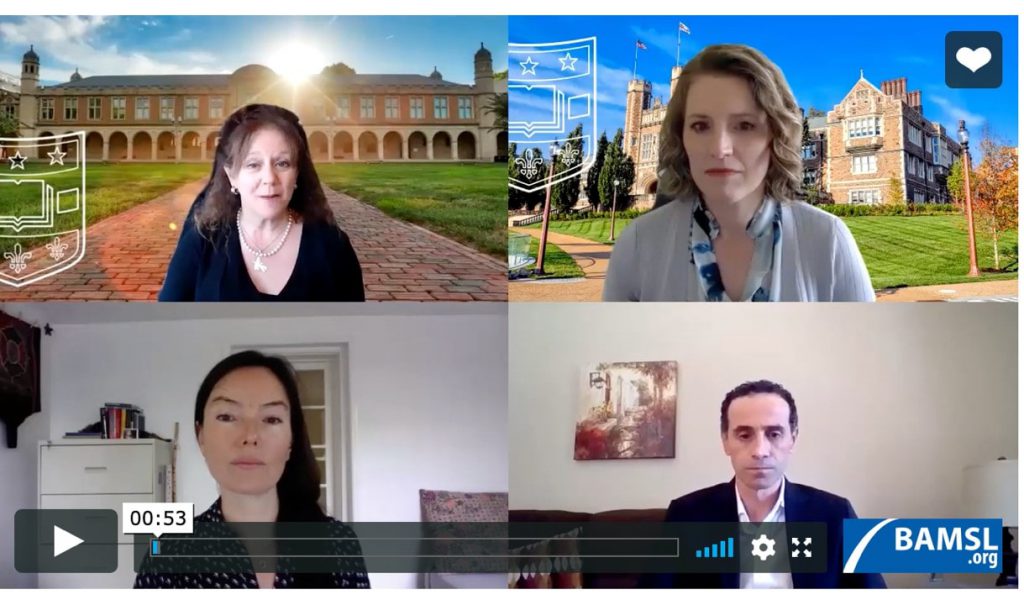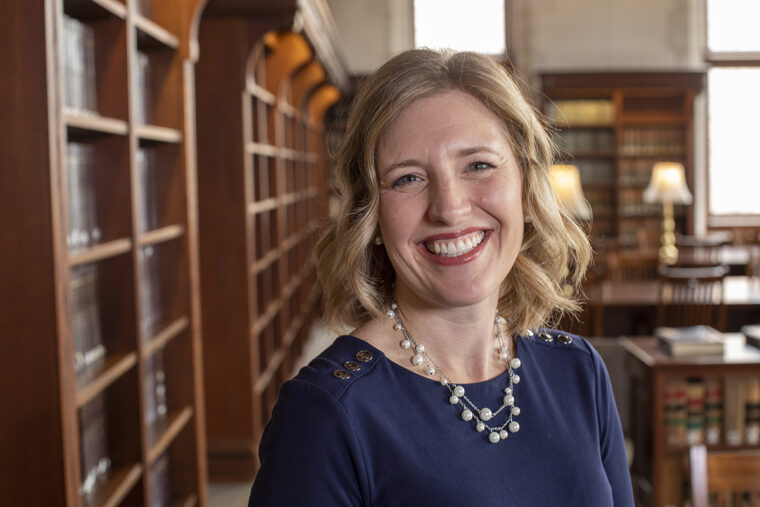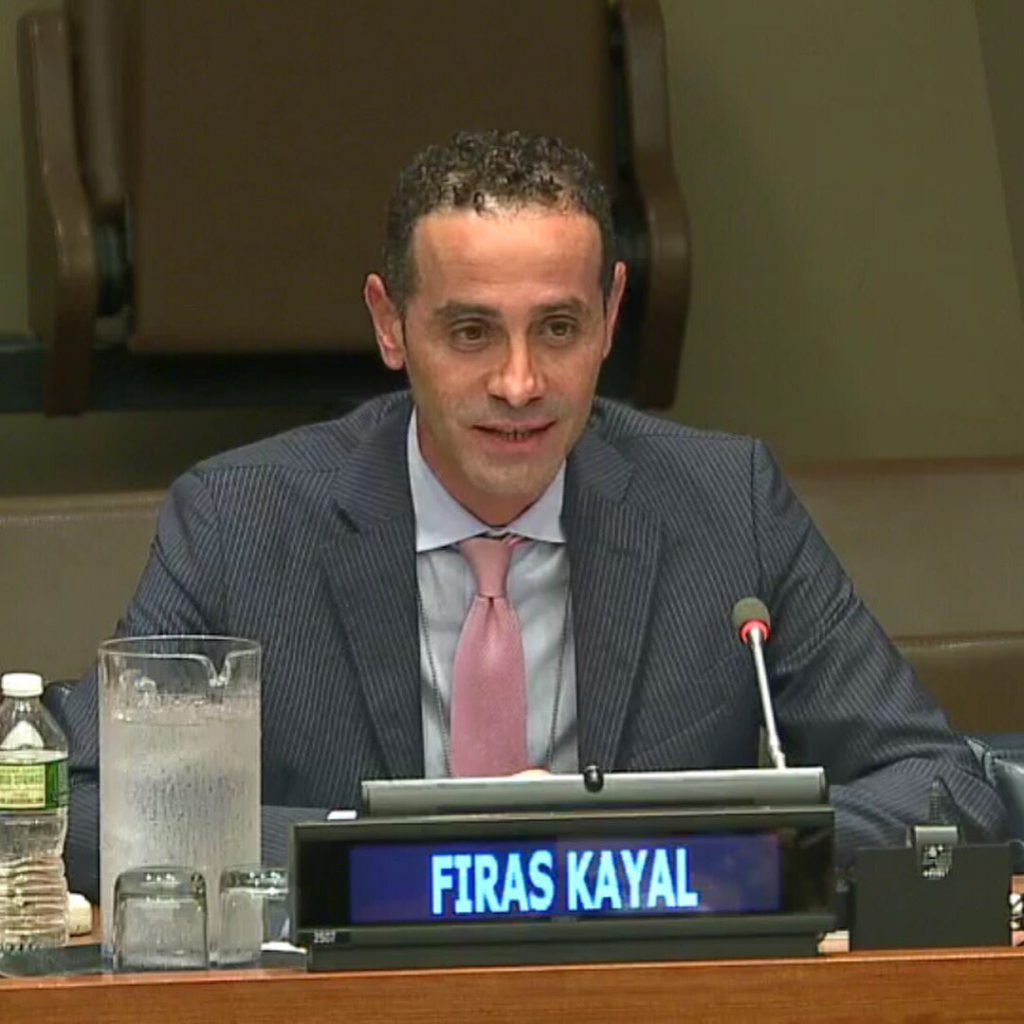By Ke Xu, LLM 2020
The Whitney R. Harris World Law Institute recently launched a new webinar series on COVID19 and International law. The first, COVID-19 and International Law: A Snapshot, was held on April 28, 2020. The second webinar, Immigrants & Refugees during COVID-19: State Responses and Responsibilities, was held via Zoom on May 14, 2020, co-sponsored by the Bar Association of Metropolitan St. Louis and the International Law Association (American Branch).

This webinar, moderated by Professor Leila Nadya Sadat, featured three experts in immigration and refugee law, international humanitarian law, and human rights law. The discussion first delved into the United States itself before looking more broadly at the global perspective. It then turns to specific sub-groups of vulnerable migrants, including females, individuals in internally displaced camps or refugee camps, and children.

Professor Sadat began with a brief assessment of the current situation. She stressed that: “Many governments around the world, including the St. Louis County, have ordered citizens or invited citizens to stay at home to help fight the pandemic. This webinar is going to take up an issue for the many people for whom the options are not very easy – refugees and immigrants.” She noted that a record number of individuals – 70.8 million- are forcibly displaced worldwide, creating humanitarian crises on nearly every continent. She then concluded: “With the spread of the coronavirus around the globe, we find ourselves in the crisis within a crisis.”

Photo by Joe Angeles/Washington University
Professor Katie Herbert Meyer, Assistant Professor of Practice and Director of the Immigration Law Clinic at Washington University in St. Louis School of Law, discussed the disproportional impact of U.S. coronavirus related restrictions on immigrants and asylum-seekers. Professor Meyer said that although immigrants make up a disproportionate percentage of the domestic “essential workforce,” they are largely left out of preventive and recovery efforts. The Migration Policy Institute(MPI) estimates that “collectively 12 million immigrant workers are at the leading edge of the response to and impacts from the pandemic,” given that six million “are at the frontlines of keeping U.S. residents healthy and fed during COVID-19 pandemic and another 6 million immigrants work in the hardest-hit industries. But even many lawful immigrants are excluded from federal benefits programs, including those related to COVID-19. Professor Meyer also discussed how the U.S. response to the pandemic is shutting the door to asylum at the U.S. border as well as closing off access to other forms of lawful immigration. Emergency public health measures have given U.S. Customs and Border Patrol broad authority to bypass immigration laws. As a result, nearly 10,000 summary deportations of migrants occurred in a roughly two-week period. Professor Meyers finished her discussion by talking about the plight of migrants in cramped detention conditions, with confirmed COVID-19 cases, and the higher risk they have been placed in for contracting COVID-19.

Mr. Firas Kayal, Senior Policy Advisor to the United Nations High Commissioner for Refugees (UNHCR), then discussed COVID-19’s impact from a global perspective on refugees, Internally Displaced Persons (IDPs), and the countries that host them. He also shared how the UNHCR has developed a strategy to respond to these global challenges and discussed the way forward. Mr. Firas first noted that the U.N. Secretary-General called for a Global Ceasefire: It is a time to “pull back from hostilities,” and “take inspiration from coalitions and dialogue slowly taking shape among rival parties in some parts to enable joint approaches to COVID-19.” Mr. Firas Kayal stressed that: “refugees are already a vulnerable population, and now the COVID-19 has made these vulnerable populations even more vulnerable.” He explained that these challenges also extend to host communities, “because the coronavirus always attacks the whole community.” Most refugees and IDPs are hosted by poor and middle-income countries, and many of the camps in which they are held, and the host countries themselves, lack adequate sanitation and medical resources. He continued: “It is very important that refugees which are being hosted in those countries are actually part of the state responsible plan and not excluded.” He emphasized funding was needed to respond to the COVID-19 challenges around the world, and especially to assist host countries. According to the Global Compact on Refugees, a key goal of international cooperation in the refugee field must be to “[e]ase the pressures on host countries.” The United Nations and the human rights communities have launched a Global Humanitarian Response Plan. As Mr. Firas pointed out: “if there is one thing that reminds us, it’s that our world is so interconnected in the time we are living right now.”

Professor Kim Thuy Seelinger, Director, Center for Human Rights, Gender and Migration at Washington University’s Institute of Public Health, brought the local and the global perspectives together by focusing on the impact of the coronavirus pandemic on vulnerable migrant and displaced populations, particularly with respect to gender-related issues. According to the UN Policy Brief: The Impact of COVID-19, “across every sphere, from health to the economy, security to social protection, the impacts of COVID-19 are exacerbated for women and girls simply by virtue of their sex.” Professor Seelinger explained that globally, women “tend to have more responsibility for caregiving.” In fact, according to a 2019 publication from the Organisation for Economic Co-operation and Development (OECD), 76% of unpaid caregiving in the world is carrying by women. While they are taking care of others, they often have less freedom to seek healthcare for themselves. This is particularly true during the coronavirus pandemic. In addition, refugees and migrants face additional gender-related challenges. As the UNHCR and Internationa Organization for Migration (IOM) acknowledged in a May 9, 2020 press release, “[b]order restrictions which have been imposed or increased as part of measures to respond to Covid-19 are impacting heavily on asylum-seekers and refugees” and are limiting mobility and access to asylum, including to women. To make matters worse, the risk of gender-based violence is also increasing. But as Professor Seelinger said, we have international and domestic legal frameworks and obligations to provide gender and refugee protection, such as the 1951 Refugee Convention, the UNHCR Guidance Notes on Gender-related Persecution(2002) and the U.S. 1980 Refugee Act.
This webinar was the second in the series. It can be watched online. The third webinar will be held on June 11 on National Security Concerns and Balancing Liberty with Protection during COVID-19.
